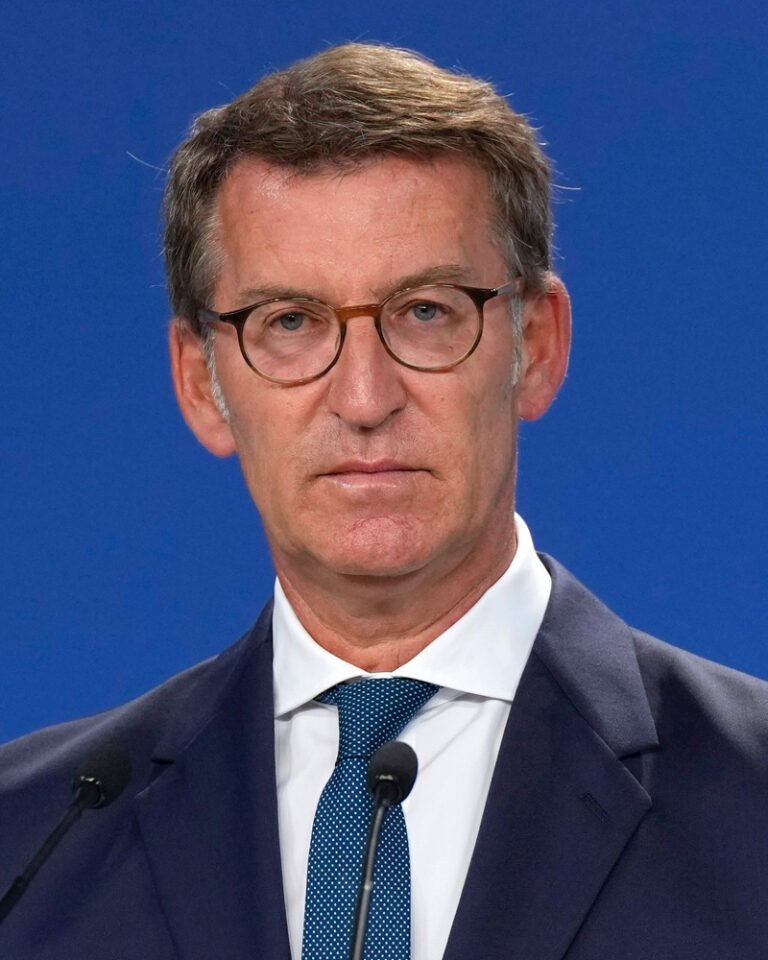Alberto Núñez Feijóo is a significant figure in Spanish politics, best known as the leader of the centre-right People’s Party (Partido Popular, PP). Born on September 10, 1961, in Os Peares, Galicia, Feijóo has built a long and influential career, particularly in his home region before rising to national prominence. He studied law at the University of Santiago de Compostela, which laid the groundwork for his future in public service and politics.
Feijóo’s political journey began in Galicia, where he became a central player in regional governance. He served as President of the Xunta de Galicia, the autonomous government of the region, from 2009 until 2022. During these years, Feijóo earned a reputation for pragmatic leadership, focusing on moderate and steady governance. His time in Galicia showcased his ability to manage political challenges while appealing to a broad spectrum of voters. This regional experience helped position him as a suitable candidate to lead Spain’s main centre-right party at the national level.
In April 2022, Alberto Núñez Feijóo was elected leader of the People’s Party (PP), a critical role that came after a period of internal party difficulties and electoral setbacks. The PP looked to Feijóo as a unifying figure capable of restoring its strength and positioning it as the leading opposition force against the ruling Socialist Party government. Since taking charge, Feijóo has focused on strengthening the party’s appeal and preparing it for future elections.
Feijóo’s leadership style is often described as moderate and pragmatic, reflecting his years in Galicia. He attempts to balance traditional conservative values with more centrist positions to attract both the PP’s base and undecided voters. His approach is designed to present the PP as a credible and stable alternative to the current government, particularly at a time when Spain’s political climate is becoming more divided.
One of the most notable aspects of Feijóo’s strategy is his openness to cooperation with the far-right Vox party. This stance marks a significant shift in Spain’s political discourse, where many parties have historically sought to isolate far-right groups. Feijóo has explicitly rejected the idea of applying a “cordon sanitaire” to Vox, meaning he refuses to completely cut off cooperation with the party. He believes that respecting Vox’s voters is important and that ignoring them would be a mistake for the PP. However, he has also set clear boundaries, stating that his party will not engage with EH Bildu, a Basque nationalist party associated with the former ETA group, unless it apologizes for past violence and helps clarify historical events related to terrorism.
Under Feijóo’s leadership, the People’s Party has been gaining momentum amid widespread dissatisfaction with the Socialist government, which has faced recent corruption scandals. Polls indicate that while the PP’s support is rising, it may not yet be enough to govern alone. This makes the possibility of a coalition with Vox increasingly relevant, especially as the next general election approaches, scheduled for 2027. Public pressure and scandals have fueled calls for early elections, although Prime Minister Pedro Sánchez has not yet agreed to this.
Feijóo’s approach to immigration also highlights his pragmatic leadership. Vox has criticized the PP for what it calls lenient immigration policies, calling for stricter border controls and tougher actions against illegal migration. In contrast, the PP under Feijóo supports policies that align more closely with European Union standards and are considered more moderate. This difference could cause friction if the two parties collaborate on a national level, but Feijóo’s willingness to work with Vox shows his focus on broadening support and preparing for complex coalition talks.
Throughout his career, Alberto Núñez Feijóo has emphasized the importance of earning public trust gradually. He has reminded supporters that political change in Spain will not happen overnight and that the PP must prove it can offer better and more stable governance. His steady, cautious approach aims to rebuild confidence in the centre-right and position the party as a key player in shaping Spain’s political future.
As Spain faces ongoing political challenges, scandals, and growing polarization, Alberto Núñez Feijóo remains a central figure to watch. His leadership of the People’s Party and his strategic openness to cooperation with the far-right reflect broader shifts in the country’s political dynamics. How Feijóo navigates these complexities will likely influence Spain’s political landscape in the years to come.







